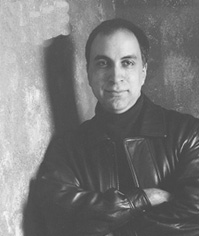
Composer Anthony Cornicello (born in Brooklyn, New York, 1964) writes music that blurs distinctions between performers and electronics, timbre and harmony, composition and improvisation, and explores the boundaries of what may be considered post-classical concert music. His music is vibrant and visceral, full of rhythmic energy and harmonic sophistication, and his forays into live electronics have led to exciting combinations of instruments and processed sound. Cornicello’s background as a jazz pianist is evident not only in the rhythmic activity of his music, but also in his constant investigation of the rich sonorities available from a variety of instruments.
He has been commissioned to write music for the Scorchio Electric String Quartet, ModernWorks! (funding from Meet the Composer/ Commissioning Music USA), the Auros Group for New Music, the Prism Saxophone Quartet, the New York New Music Ensemble, David Holzman, the Group for Contemporary Music, and the InterEnsemble of Padova, Italy. His work has also been featured on the Guggenheim Museum’s “Works and Process” series. Cornicello’s works have also been performed by the Chicago Civic Symphony, Parnassus, ALEA III, Composers Concordance, Madeleine Shapiro, Robert Black, among many other outstanding groups and solo performers. His music has been presented as part of the Darmstadt International Festival of New Music as well as the June in Buffalo Festival.
Cornicello’s Second String Quartet has been recorded by the Atlantic String Quartet; the Second Sonata for Piano by David Holzman (Centaur). More recently, his Post-Modern Waltz was recorded by Eric Moe for Albany Records. A portrait CD of Cornicello’s works is scheduled for 2006 release on Albany Records.
As a performer, he has conducted or played piano in his own works on numerous occasions. While a graduate student at Rutgers, he formed and directed the Janus Ensemble, a group dedicated to contemporary music. More recently, Cornicello has begun performing on the laptop, using a variety of interfaces and the Max/MSP program. Those performances, mostly with EEE!, have had a notable impact on his music, as EEE!’s music ranges from hip-hop to experimental noise. EEE! is based at Eastern Connecticut State University, where Cornicello is an Associate Professor and Director of the Electronic Music Lab.
Cornicello received the Ph.D. from Brandeis University, where he studied with David Rakowski, Eric Chasalow, and Martin Boykan. His teachers also include Charles Wuorinen, Gérard Grisey, and Richard Beirach.
His current fields of interest include developing unusual interfaces for live computer music performances, as well as continuing to investigate resonance and spatialization. His recent and current projects (mostly for string instruments and electronics) have been exploring the latter two, and the series of experimental works ReZenant Garden, performed by EEE! have operated on all three areas of interest. Future projects will include works for instrumental groups or soloists and electronics, as well as turntablists.
Cornicello's works are published by C.F. Peters Corporation and APNM, and he is a member of BMI.
|
|
|
|
|
|

Monday, April 24, 2006
Since I can't respond to Jeff Biegel on his blog page:
Here's what Jeff wrote:
"I am proudly posting news that the Billy Joel Concerto will be premiered since its conception in October 2005. Naturally, working with his excellent team, I've needed to acquire approval in every step in order to write the piano part, acquire an orchestrator, have Mr. Joel's approval of the orchestrator, synthesized demo, performances and publicist's approval of press releases. Aside from this, I arranged the piano part of Billy's wonderful 'classical' pieces with the notion that with such beautiful melodies and harmonies, no doubt a tribute to Chopin, Schumann, Rachmaninoff,Tschaikowsky and others, it's in a new way which I am hoping will develop into a trend of new Romantically inspired works to emerge. The movie soundtrack composers have indeed kept this style alive, and with their delving into the concert hall (like Gershwin did amongst several Paul Whiteman Experiments in Modern Music in the early 20th century), might we be ready for a revival of this movement amongst today's composers? The music of Gershwin, Addinsell, and others of this genre might not be considered the most profound of all music, but hasn't their music helped shape our popular audience attendance, which may have helped entice them to listen to newer forms of music? Is there room for pop icons to follow their heart and write classically contrived melodies? Were they trained classically and might they be able to do this? What might they create? Keith Emerson of Emerson, Lake and Palmer certainly wrote a marvelous piano concerto in 1977, and note John Corigliano popularized himself with The Red Violin. Is there 'classical' ability amongst the many hot-ticket-selling pop stars that can contribute to the concert hall today? Many questions for sure, but is it a way to ensure for future symphony orchestra attendance?"
+++++++++
Now, here's my problem with this: apparently, to make this work Jeff has to make the piano part and hire an orchestrator to create the orchestral part. While I think Keith Emerson may have worked with an orchestrator, he definitely wrote (and played) his own piano part. And Corigliano did not really 'popularize himself with The Red Violin." By that point, he had already won an Oscar for a filmscore, wrote popularist pieces such as Pied Piper Fantasy, and had written a hit opera.
Furthermore, how is Billy Joel actually writing "classically contrived melodies"? Most of those little piano pieces were actually transcribed and co-written with someone else (I'm bad with names tonight, sorry.) Yes, he had to have an 'orchestrator' to write a piano solo piece. It sounds like a bad joke, except that the punch line is preceeded by a dollar sign.
Finally, didn't we already experience Neo-Romaticism? Wasn't that the 'new trend' of the 1980s?
posted by Anthony Cornicello
|
| |



